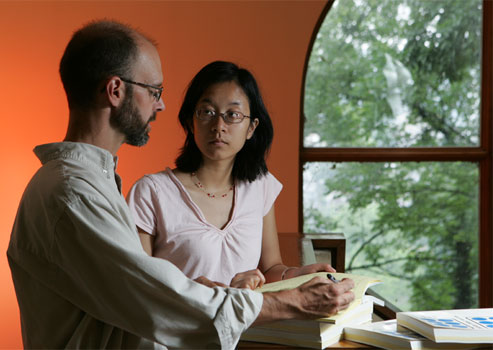Research by Christopher S. Ruebeck, assistant professor of economics and business, that found that left-handed college-educated men earn significantly more than their right-handed counterparts has been featured on “CBS News Sunday Morning,” NPR’s “Marketplace”, Reuters News Service and CNNMoney.com.
The Washington Post, Sacramento Beeand other major papers across the country have also run stories about the study. In addition, Ruebeck was interviewed for an upcoming article in Newsweek magazine.
In his Washington Post“Unconventional Wisdom” column, entitled “More Evidence That Lefties Have the Right Stuff,” Richard Morin wrote, “Left-handed men who attended at least a year in college go on to earn significantly more than their right-handed classmates — even more reason they’ll be celebrating International Left-Handers Day on Sunday.
“Among the college-educated men in our sample, those who report being left-handed earn 13 percent more than those who report being right-handed,” said economist Christopher S. Ruebeck of Lafayette College.
“And lefties, stay in school: Those who finished all four years of college earned, on average, a whopping 21 percent more than similarly educated right-handed men. Curiously, the researchers found no wage differential among left- and right-handed women.
“The study is the latest to suggest there’s something special about lefties. Other researchers have found that left-handers are over-represented on university faculties, as well as among gifted students, artists and musicians.”
The research by Ruebeck and his co-authors, Joseph E. Harrington, Jr. and Robert Moffitt of Johns Hopkins University, was reported in a new working paper published by the National Bureau of Economic Research. The study is forthcoming in the British journal Laterality.
Ruebeck and his colleagues based their findings on a detailed analysis of data from the federally funded National Longitudinal Survey of Youth, a national survey of more than 5,000 individuals. The sample consists of individuals who were age 14-21 in 1979 and were interviewed annually. They based their analysis on the follow-up survey conducted in 1993, when those in the survey sample were 28-35. Among the data was whether the individual was right or left-handed.
“We wanted to take a look at the general population, so we eliminated the data from the extremely high earners, both left and right, so the numbers wouldn’t be thrown off by the occasional superstar left-handed baseball pitcher,” Ruebeck says.
Ruebeck regularly includes students in his research projects. This summer,he worked with Thuy Lan Nguyen ’07 (Hanoi, Vietnam), who is double majoring in mathematics and business & economics, through Lafayette’s distinctive EXCEL Scholars program. Together, they examined the forces that affect computer companies’ decisions to remove products from the market.
During the spring semester, he and mathematics-economics majorDimitar Marmarov ’07(Plovdiv, Bulgaria) researched the efficiency of the oyster fishing industry in New Jersey in the late 1800s.
Ruebeck has also advised numerous students in honors thesis research and is a past recipient of the Student Government Superior Teaching Award.
EXCEL students conduct research with faculty while earning a stipend. The program has helped to make Lafayette a national leader in undergraduate research. Many of the more than 160 students who participate each year share their work through articles in academic journals and/or conference presentations.
As a national leader in undergraduate research, Lafayette sends one of the largest contingents to the National Conference on Undergraduate Research each year. Forty students were accepted to present their research at this year’s conference.

Thuy Lan Nguyen ’07 and Chris Ruebeck, assistant professor of economics and business, worked on research focusing on why computer hard drives are pulled from the market.
